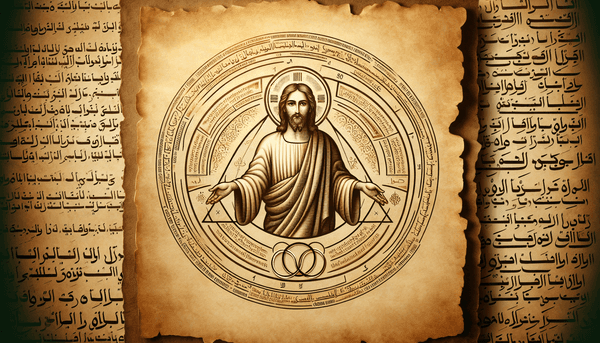The Symbolism of the 'Lion of Judah'
The 'Lion of Judah' is a title that resonates with power, strength, and majesty, representing Jesus Christ as the rightful ruler and king. This symbol, deeply rooted in the heritage of the tribe of Judah, emerges from the Book of Genesis where Jacob blesses his son Judah, likening him to a lion's cub and forecasting the coming of a ruler from his lineage (Genesis 49:9-10). In the New Testament, the Book of Revelation reveals Jesus as the 'Lion of Judah,' triumphant and worthy to open the scroll of destiny (Revelation 5:5). These verses, along with others such as Hosea 11:10 and Isaiah 31:4, not only solidify Jesus's connection to the tribe of Judah but also affirm His role as the Messiah, prophesied in the Hebrew Scriptures and fulfilled in the Christian narrative. The 'Lion of Judah' thus stands as a beacon of hope, signaling the ultimate victory of Christ and His eternal kingship, as attested by the writer of Hebrews who acknowledges Jesus's lineage from Judah (Hebrews 7:14).
The Personhood of the Holy Spirit
The Holy Spirit, often the most enigmatic member of the Trinity, is depicted in Scripture as possessing personal attributes and engaging in relational dynamics with believers. Jesus describes the Spirit as another Helper, who will abide with His followers forever, providing guidance and revealing truth (John 14:16-17). In moments of weakness, the Spirit intercedes for believers with groanings too deep for words, aligning their prayers with the will of God (Romans 8:26-27). The Spirit's role extends to the profound exploration of divine mysteries, searching everything, even the depths of God, much like one's spirit knows one's own thoughts (1 Corinthians 2:10-11). These passages affirm the Spirit's personhood, challenging believers to recognize His presence, heed His voice, and be sensitive to His leading, acknowledging that to grieve the Spirit is to offend a personal being who is actively involved in their lives (Ephesians 4:30).
Jesus Claiming Divinity
The claim of divinity is a cornerstone of Christian belief, and Jesus Himself made statements that assert His divine nature. In the Gospel of John, Jesus proclaims His unity with the Father, saying, 'I and the Father are one' (John 10:30), a declaration that elicited charges of blasphemy from His contemporaries. His use of the divine name 'I am' in John 8:58 connects Him to the eternal self-existent God revealed to Moses in the burning bush. Further, Jesus invites Philip to recognize that seeing Him is equivalent to seeing the Father (John 14:9). These claims, along with the early church's affirmation of Jesus's divinity, as seen in Paul's writings to the Philippians and the Colossians (Philippians 2:5-8; Colossians 2:9), form the bedrock of the doctrine of the Incarnation, which holds that in Jesus, the divine and human natures are united in one person.
Conclusion
Our exploration through the themes of the 'Lion of Judah,' righteousness in Christ, healing for the brokenhearted, the personhood of the Holy Spirit, the divinity of Jesus, and the conquest over habitual sins such as lust, reveals the multifaceted beauty and depth of biblical teachings. These themes are not merely theological concepts but are meant to inspire, guide, and comfort us in our daily walk with God. Just as the tapestry of prophecy intricately weaves the life and mission of Jesus Christ throughout Scripture, so do these truths weave through our lives. As we close this journey, may we carry with us the assurance of Christ's victory, the righteousness imparted through faith, the healing touch of God upon our wounds, the fellowship of the Holy Spirit, and the strength to overcome the trials we face. Let these truths resonate in our hearts and minds, spurring us on to deeper faith and greater love for the One who calls us His own.
FAQ
Q: What does the term 'Lion of Judah' signify in the Bible?
A: The term 'Lion of Judah' is a symbol used in the Bible to represent Jesus Christ. It originates from the Book of Genesis and is also mentioned in the Book of Revelation. It signifies the power, strength, and majesty of Jesus as the rightful ruler and king.
Q: How do we become the righteousness of God through Jesus?
A: We become the righteousness of God through Jesus as described in 2 Corinthians 5:21, which states, 'God made him who had no sin to be sin for us, so that in him we might become the righteousness of God.'
Q: Where in scripture does it say that God heals the brokenhearted?
A: The scripture that says God heals the brokenhearted is found in Psalm 147:3: 'He heals the brokenhearted and binds up their wounds.'
Q: Can you show me verses that depict the Holy Spirit as a person?
A: Certainly! Verses that depict the Holy Spirit as a person include John 14:16-17, Romans 8:26-27, and 1 Corinthians 2:10-11, which speak to the Spirit's personal attributes and interactions with believers.





